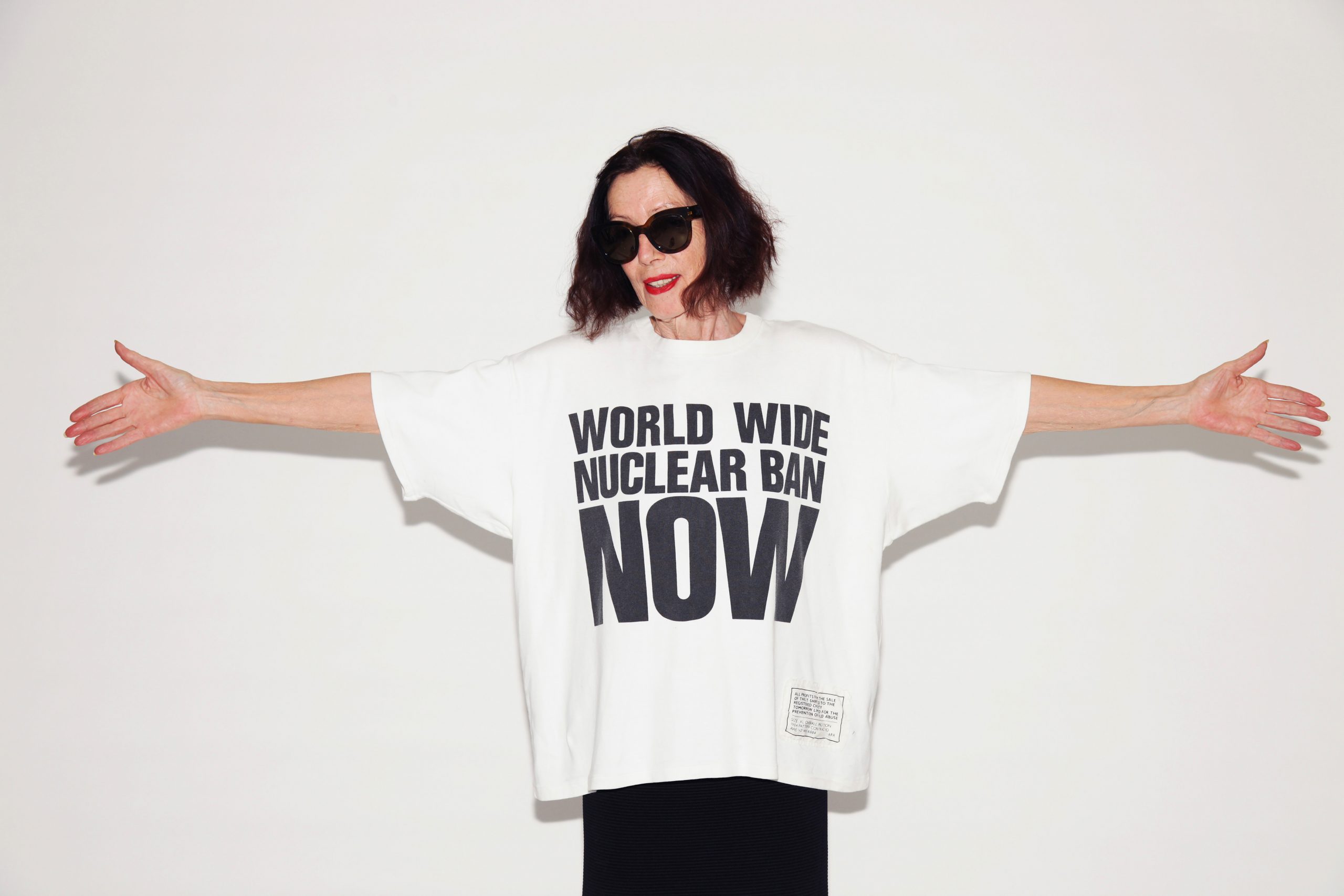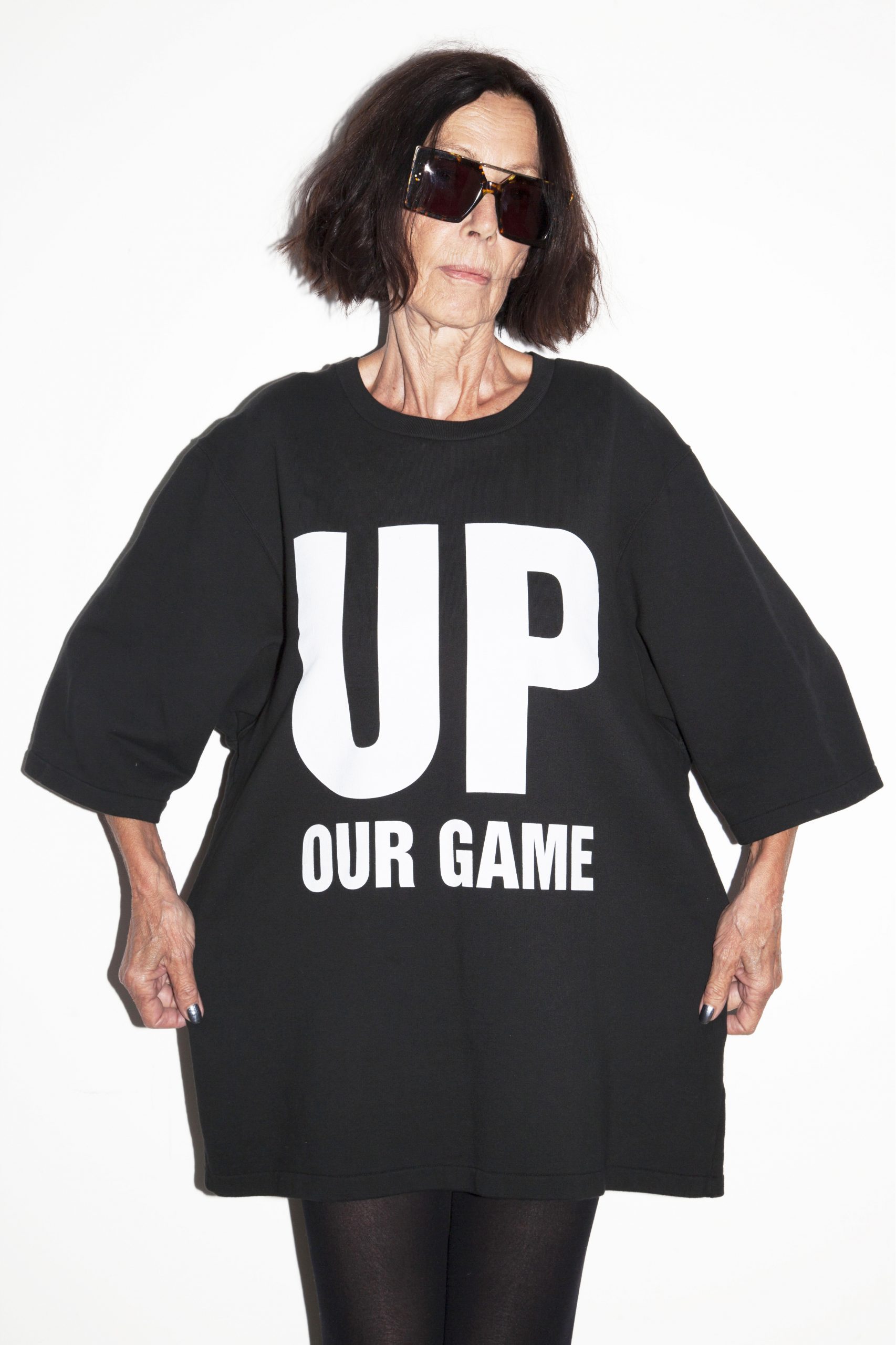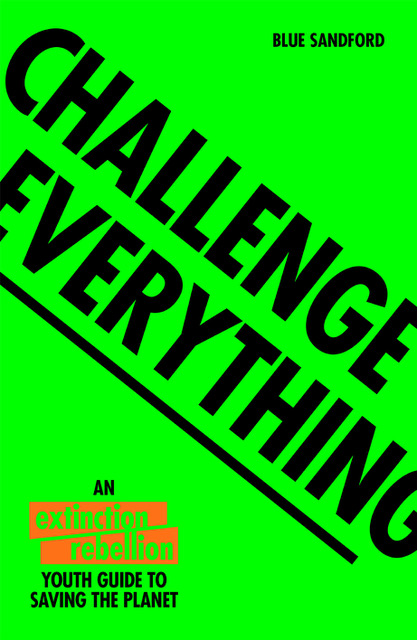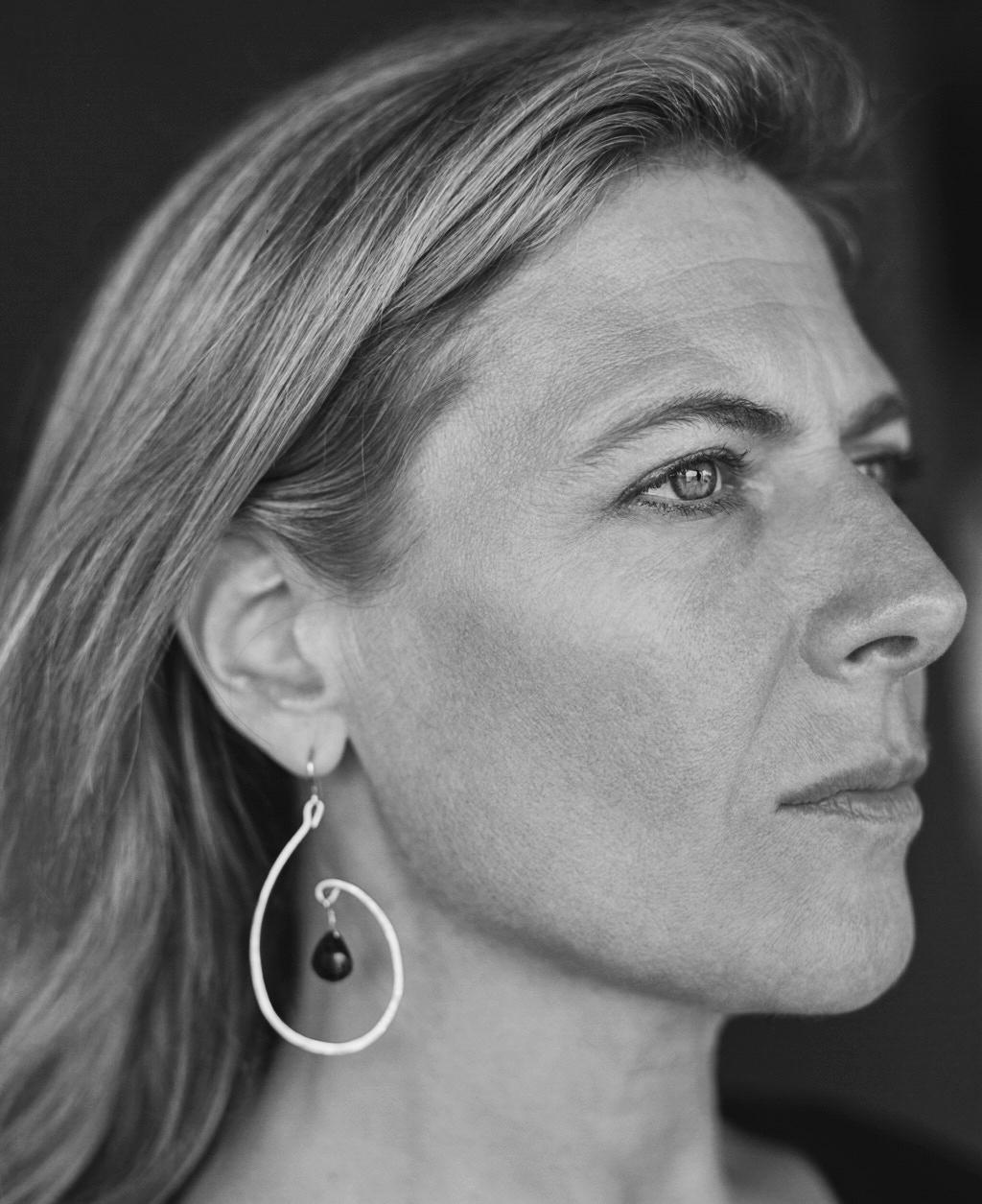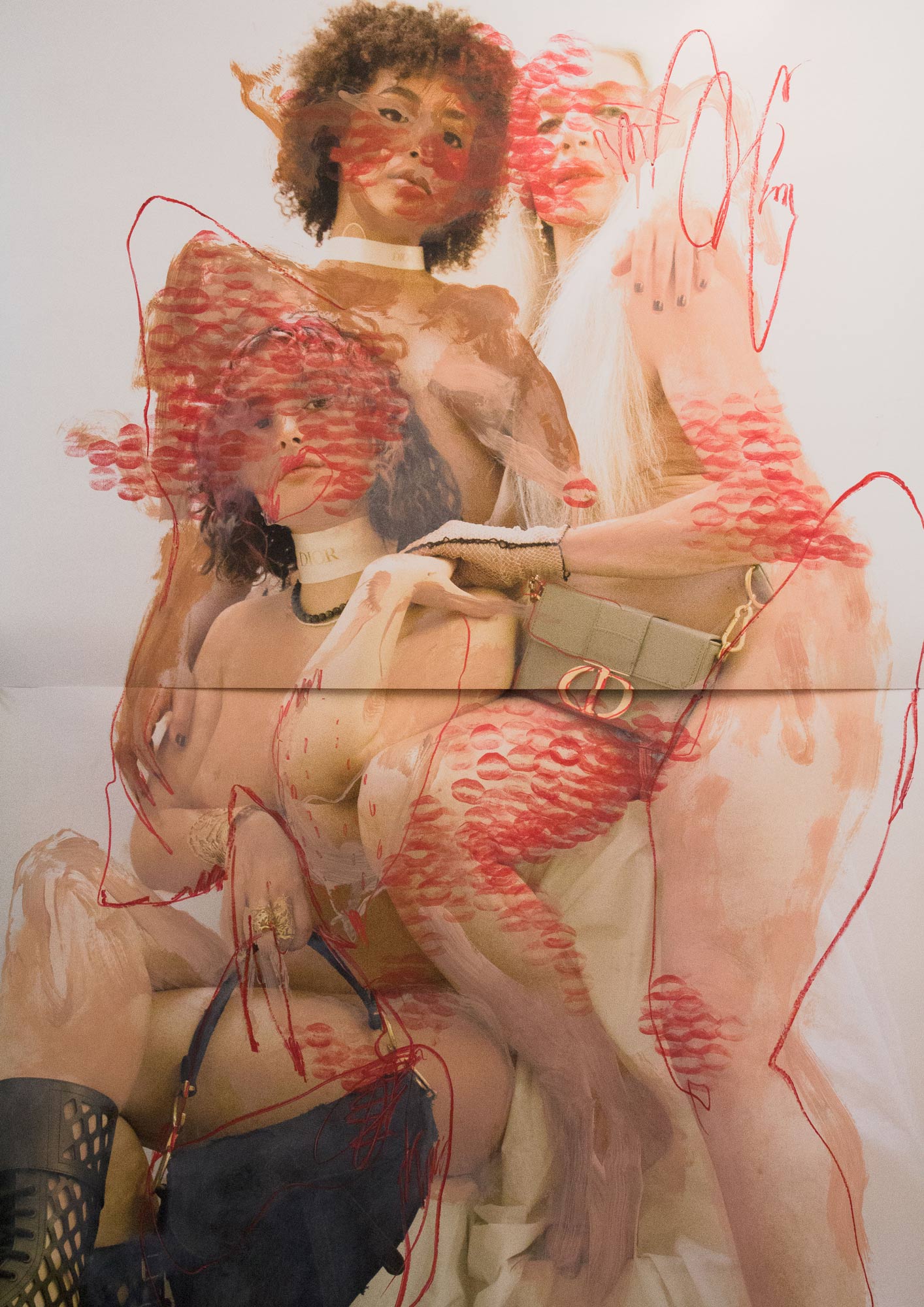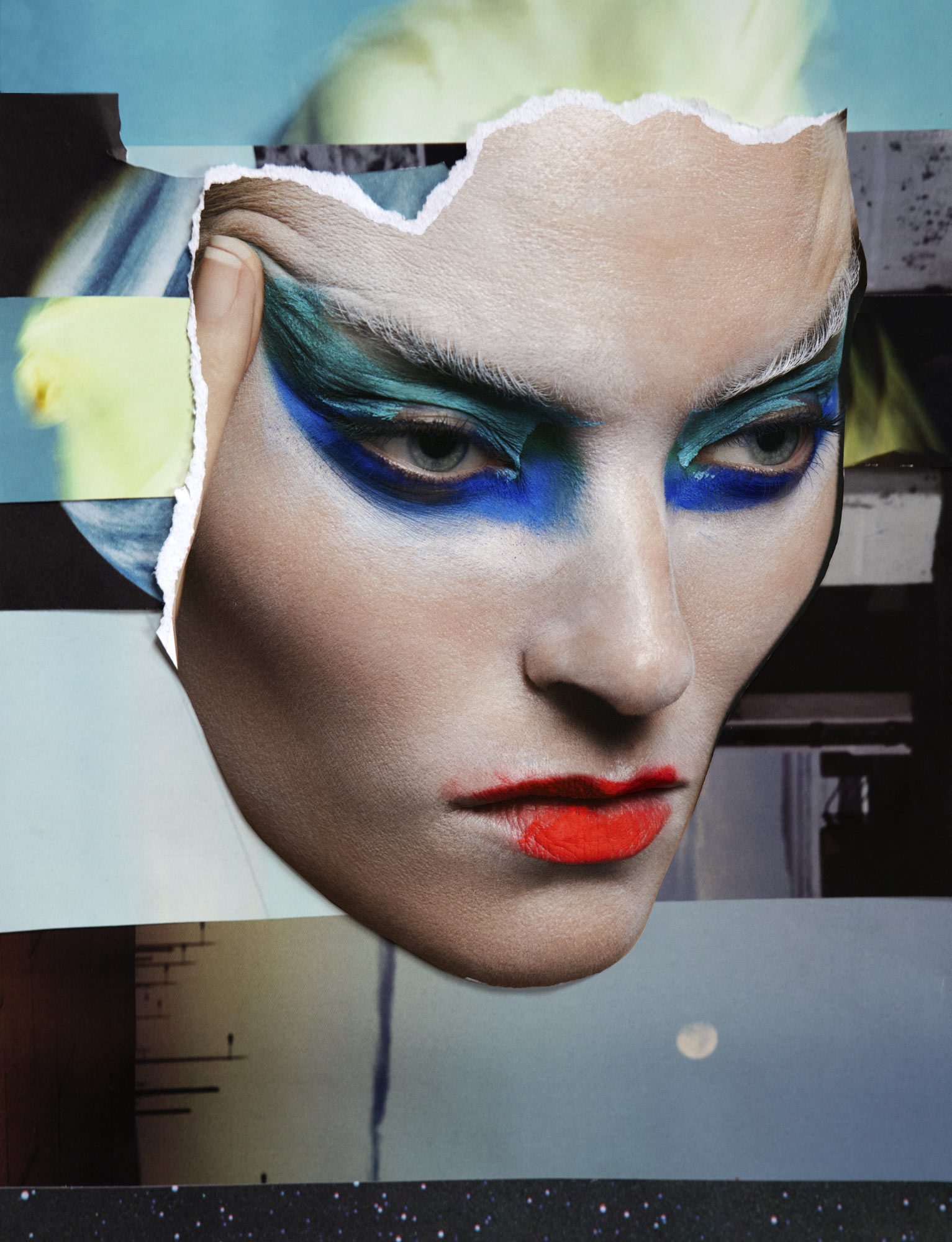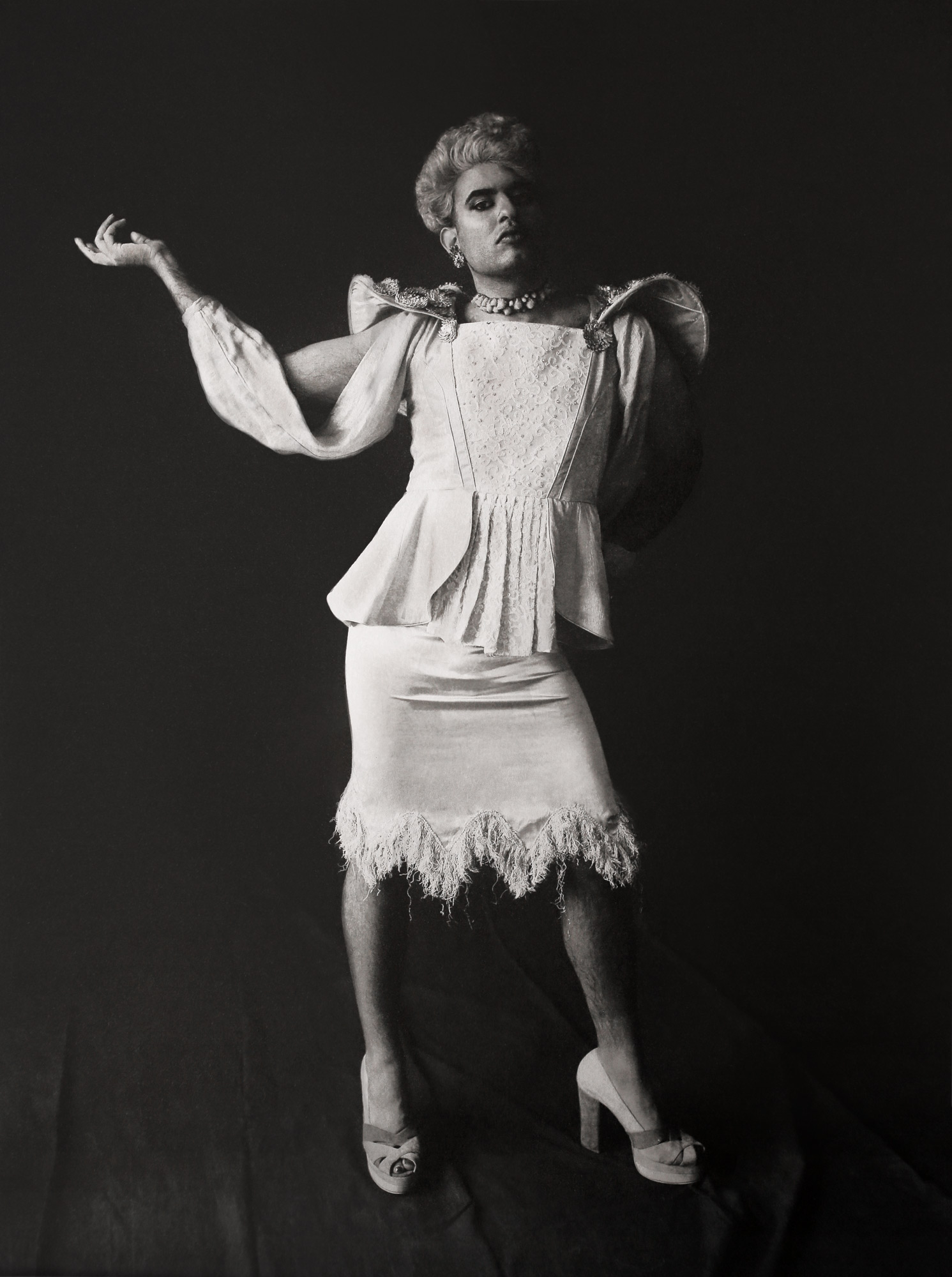Katharine Hamnett: in Conversation with The September Issues’ Shiv Lyons
The designer talks politics, ethical business, and sustainability in the fashion industry.
On an evening in early February, British fashion designer and activist Katharine Hamnett, 72, is staying with friends in Majorca, off the coast of Spain. “We’re reveling in the beauty of it all” she says over the phone, remarking on swimmers bathing in the sea; adding, near prophetically, “and yet the reality is, we’re all fucked.” A self-described “optimistic pessimist,” Hamnett speaks in a measured tone, her words dripping with deadpan lyricism. “I’ve been busy making immune-boosting salad dressings and distributing them to my friends,” she recounts, musing on the looming coronavirus outbreak that would in just a few week’s time become a worldwide pandemic. “It’s just huge amounts of garlic that I soak vinegar for about five minutes.
A pivotal force of modern fashion, Hamnett is revered in equal parts for her influential designs—
Interview:
Shiv: It’s a pleasure to have you on the phone. I’ve been collecting slogan t-shirts since I was fifteen, and there’s a few of yours that I absolutely treasure. I’m fascinated with the way you use your brand and your voice to educate, inform and inspire people to make the world a better place.
Katharine: Well, the fact that I could do it at all was because I was my own boss. I always had plenty of people in my company saying that I had gone too far, but I would just tell them “fuck you, it’s my brand and I’ll do what I like!” By the mid-’80s, we were selling in 700 retailers across 40 countries and getting an obscene amount of media coverage. Meanwhile there were all of these terrible atrocities going on around the world. I thought, let’s do something for the general good with all of this excess publicity and media attention.
Shiv: How did you initially come up with the idea for the slogan T-shirts?
Katharine: The slogan T-shirts came out of my interest in Buddhism. My sister Charlotte introduced me to Buddhism in the late ’70s, saying “this is the one; this is the philosophy that is all-encompassing.” Around that time, a friend of mine put on an exhibition about Buddhism and I thought “well this is absolute crap, no one is going to be interested in this.” I decided that in order to get people’s interest, the best thing you could do would be to take the central tenet of Buddhism, which is essentially “CHOOSE LIFE,” and print it in huge letters on a T-shirt that could be read from 200 meters away. You can’t not read a T-shirt, there’s no protection from it—before you realize it you’ve already fucking read it and the phrase gets into your brain. Hopefully it circulates and makes you think and ultimately encourages you to do the right thing.
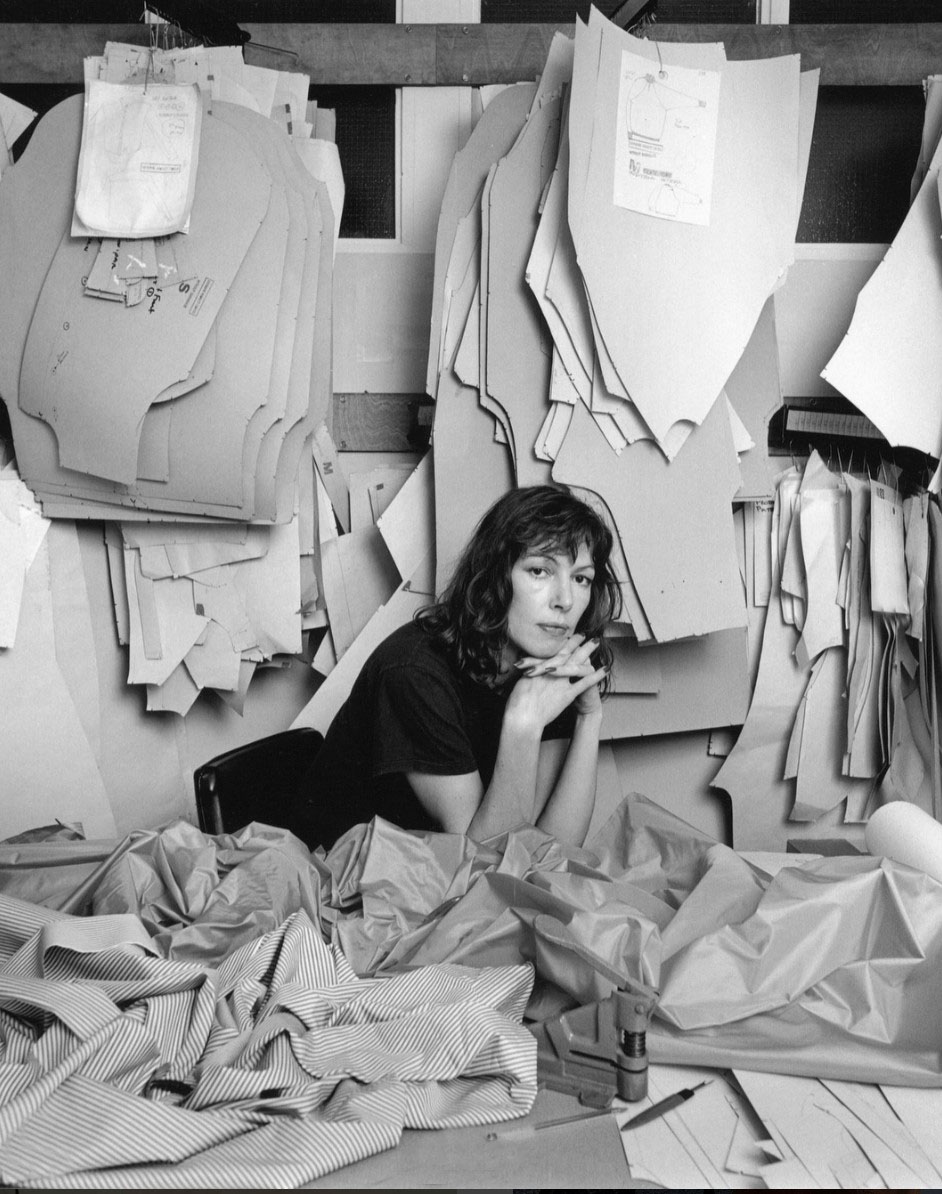
Courtesy of KATHARINE HAMNETT
When the brand was starting out, we were getting copied all the time by other brands, and I thought it would be absolutely hysterical if they were to copy the slogan tees. You know how that happens all the time now—a brand like Zara will copy a smaller designer and sell it at a quarter of the price, making the original design unsellable. But the trouble was, our garments were actually made ethically and out of durable, sustainable materials, whereas the copies were not. I thought it would be quite funny if these brands were to copy the slogan T-shirts, particularly because they are making a political statement. And they did copy them, but of course they got it all wrong. They were much tamer, of course. They’d never put out something controversial like “LEADERS SUCK.”
Shiv: Which of your slogan tees do you find most resonates with you?
Katharine: I’m thrilled with the “CHOOSE LOVE” one that we’ve done because it’s really a note to self. I should have that written on the inside of my glasses, because I can be hateful and vengeful and horrendous at times just like everybody else. We need to be mindful all the time and recognize that love is the only way. We have to choose love in everything we do.
Shiv: Absolutely. I’m really fascinated with the power of words. The way that you use them reminds me of the phrase “your words are your weapon.” There really is no easier way to spread a message than to wear your heart on your T-shirt.
Katharine: The typeface we use is actually nicked from The Sun—which, if you aren’t familiar, is a real crap newspaper in the UK. You can read the headlines of The Sun from fucking miles away. I was walking down the street one day and passed a newsstand and just thought “right, that’s the one.”
Shiv:(Laughs) That’s marvelous. You are one of the first designers to champion fashion as political art. When you started making the T-shirts, did you realize their power to create social change?
Katharine: Well to be honest, I don’t know if they did.
Shiv: It’s really so tragic how they’re actually even more relevant now than when you started making them 40 years ago.
Katharine: Yes, they’ve failed completely! As have all of our organized peace efforts. We’ve just gone down the wrong track. When you have a million people in your bubble saying the same thing, it can feel as though you can change the world. But in actual fact you’re being ignored. The only thing that will really change our politician’s behavior is something that threatens their ability to get re-elected.
Shiv: Everything is fucking political now, isn’t it? Do you think that politics is something that we should be learning about in school?
Katharine: Absolutely. I went to quite a good school, and we weren’t taught anything about 20th century politics. My father worked for the British Intelligence Agency, so I was lucky to be introduced to politics at a very young age. I quickly learned how power corrupts. The government is owned by the arms industry and the agrochemical industry and the fossil fuel industry, and we’re taught to keep our noses down and work our 9-5 jobs from the age of 18 to 65 and give up half of our money to the government. The only money that politicians have is the money that they collect from our taxes. Nobody seems to realize this. We’ve got the right to demand that our money is used in the way that we want it to be used. But we’ve been rotted by comfort post World War II.
Shiv: Power Corrupts—that’s a good T-shirt.
Katharine: In this incredible material society, we’ve allowed corrupt idiots to decide how our money is spent and watched them wreck our world and destroy our future. Things have got to change.
Shiv: Absolutely—and particularly in regards to the environment. It’s fucking mad.
Katharine: Yes—just look at the evidence. Australia is on fire, the Amazon is on fire, we’ve got the highest temperatures on record in the past decade, and carbon dioxide emissions are going up. The insect population is devastated. The sea is polluted with hideous chemicals and microplastics. We’ve got to do something radical, because right now we aren’t making any progress. We need to rethink the way we do popular protests. We have to get politically involved, pay attention to the way that our politicians are voting on singular issues, and write to them and tell them that we won’t vote for them unless they represent us.
Shiv: Last year, Dictionary.com crowned “existential” as the word of the year. The nature of human existence is ultimately determined by an individual’s freely made choices. A lot of what we’ve been talking about comes down to choice, and what we choose and how we choose it.
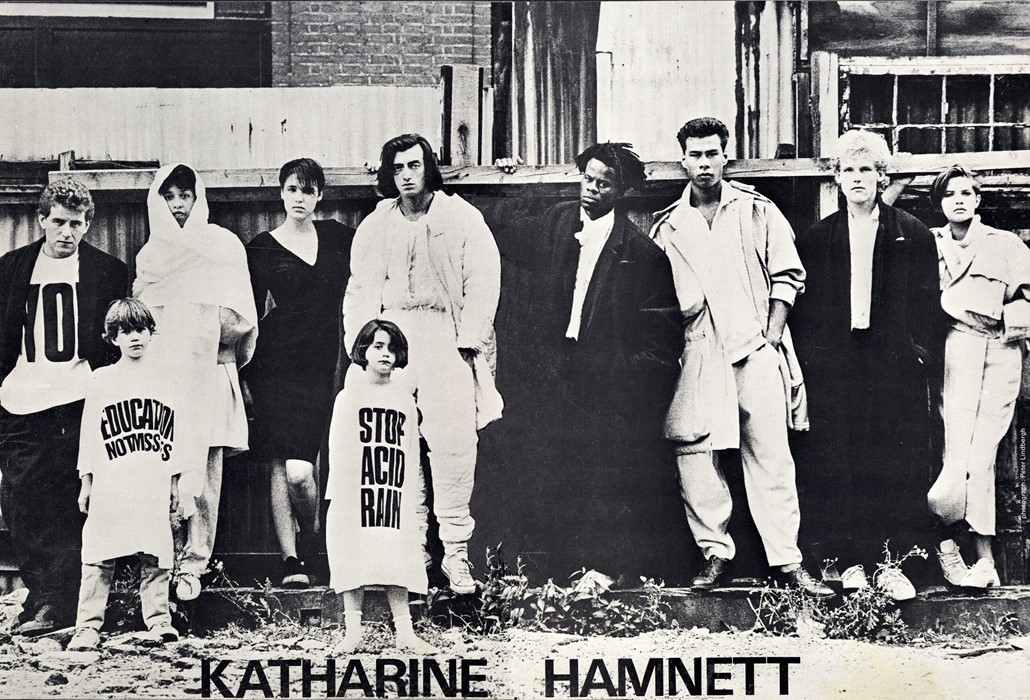
ph. PETER LINDBERG | Courtesy of KATHARINE HAMNETT
Katharine: That comes down to awareness and education. There’s a massive decline in civilization because education is so poor. Even art and fashion education is crap compared to what my generation had. It’s just a machine for making money. Education should be free.
Shiv: Yes, I used to work as a teacher and one of the things I struggled with most was how much education costs. What are your thoughts on the current decade? If we look back on the 2010’s, we seem to have disrupted everything but resolved absolutely nothing.
Katharine: No! We’ve had all these marches and these conferences like Davos where something like 1500 private jets showed up while we’re talking about climate change—it just makes me want to throw up. Everything’s been green-washed but it’s all just lies.
Shiv: How do you feel about this with regards to the fashion industry? Do you think it’s time to redefine sustainability, which has become such a buzzword over the past decade?
Katharine: The only thing that is actually going to change the fashion industry is if brands are forced by legislation to make ethical decisions. The legislation that I am proposing, specifically within the EU, requires that all goods must be made to the same standards and comply with EU employment and human rights. All outsourced factories would have to comply on an environmental level and they’d have to raise their human rights standards and pay their workers a realistic living wage, not some crap wage that’s just fudged up pennies from the dust. You’d create better jobs in outsourced countries, clean up chemical discharge, and in turn you’d also create jobs within the EU.
From an environmental standpoint, clothes are best made nearest where they’re consumed. The biggest change the industry could make would be to switch to sustainable materials such as organic cotton. The chemicals that are currently being used in fabric production are heinous, and brands need to be held accountable. We need to look at where our energy is coming from, in both manufacturing and transport.
Hydrogen seems to be one of the best kept secrets around. Some car manufacturers are looking into using it as a renewable energy source, because it’s completely carbon free. When you turn hydrogen into electricity, all you get is water vapor. It’s also easily stored and transported. I think it could be a climate game-changer. These are the things that the clothing industry should be looking into as an alternative. Additionally, we should be looking into the effect of the raw materials we are using, such as PVC. I’ve seen a number of contemporary brands that are using PVC coated fucking canvas and claiming to be sustainable! How dare they!

Shiv: There’s a lot of that—brands advertising as sustainable because it’s trendy, but it’s all bollocks really. A lot of it, as you said, comes down to legislation, but it’s all just become such a mess. Where would you begin?
Katharine: I think we’ve got to support young designers who are trying to do things sustainably. We’ve got to source our materials from sustainable farmers. Tens of thousands of farmers are killed every year due to pesticide poisoning in conventional cotton manufacturing, and it causes long term contamination of the aquifer. These pesticides are persistent. They don’t just do their job and go to sleep—they carry on killing. The earth is still feeling the effects from WW2 nerve gases. We need to stop contributing to this contamination.
Shiv: What do you think of the idea of restructuring what fashion really means in terms of the idea of “reduce/reuse/recycle/restyle/remake?”
Katharine: I think that’s all good, but you know, not everybody knows how to turn a pair of jeans into a skirt. It’s good to know how to sew and mend our clothes, but not everybody can. Sewing should be taught at schools. I learned to make my own clothes because I had such shitty pocket money when I was young, but I still had to look smart enough to steal all the cigarettes at the Russian Embassy. (laughs)
Without clothes, we couldn’t live. Clothing is how we project our identity. It’s a primal activity to cover and decorate our bodies, and it’s not going to go away. It’s one of the largest industries on the planet, so we need to do something about the environmental effect it has. We should be mining our landfills and using that as our treasure.

Courtesy of KATHARINE HAMNETT
Shiv: Do you think that we also need to reassess the consumer crisis and kill off things like the influencer?
Katharine: They’re never going to go away. The influencer has been around since the 18th century. A lot of them are silly idiots, but I think they’re the wrong target. I wouldn’t even worry about them.
Shiv: Anais Nin wrote that “something is always born of excess: great art was born of great terror, great loneliness, great inhibitions, instabilities, and it always balances them.” Do you think that this sort of restructuring will force a resurgence of creativity?
Katharine: We would hope! I just think that young people are innately creative, it’s like hormonally driven. But what’s really heartbreaking is the collapse of manufacturing in Europe. A lot of young designers aren’t going into factories and learning how to use machines. We’ve already lost so many skills, such as the beautiful practice of lace-making, and it would be a shame to lose any more. These practices have to be worthwhile and well paid.
You’ve really got to ask whether capitalism works in the fashion industry. I think that co-ops in which all profits are shared equally within all members—sales directors, managing directors, the people who are crafting the garments—are the way of the future for fashion. Craftsmanship needs to be valued. An item like an Hermes bag, for instance, takes days and days to make. It’s such a beautiful craft. If the value of that bag even at wholesale was shared equally among the staff, suddenly it would be rather a good job to make those bags.
Shiv: That goes back to what you were saying about your ‘CHOOSE LOVE’ slogan T-shirt—if we’re in a position to apply that mantra to everything, that is the solution.
Katharine: Absolutely. I always related to the consumer, and I didn’t give a shit about anybody else. You know, clothes have such magic to them. It’s extraordinary. There are these tiny elements that come alive in a garment when a person puts it on. I think that any piece of art or clothing has a soul, and when someone wears it, this whole narrative comes alive. That’s what love does, it brings out one’s innate beauty. That’s why 40 years in the business I never get tired of making clothing. You see someone put it on and become transformed.
Shiv: Something that you’ve said is that, “optimists would say that we’re running out of time, pessimists would say we already have, and I’m an optimistic pessimist.” Can you elaborate on this statement?
Katharine: I think that we need action now. Hydrogen gives me hope.
Shiv: Hydrogen gives me hope! You should put that on a T-shirt.
Katharine: We should divest from fossil fuels into using hydrogen, or a combination of hydrogen and renewables really gives me hope. 71% of the world’s surface is covered in water—and that is 60% hydrogen. It’s an accessible resource. We can use it for energy supplies for transport and electricity and energy generation and storing renewables. The biggest argument against renewables is “well, what do you do when the wind don’t blow and the sun don’t shine?” Rather than using nuclear energy, we can use hydrogen to generate renewable energy and store it.
The thing that drives me absolutely mad is when people say “the younger generation have got to solve it.” Fuck off. Let’s look after our children. We’ve made this mess, and it’s our responsibility to solve it. We should be crawling on our hands and knees trying to fix the world, rather than this huge abnegation of responsibility. The party is fucking over and it’s time to get to work and fix things. The success of an organism is in its ability to reproduce, but we have to look after our children and the world that they are going to live in and allow them to reproduce. The kids are getting it, but they’re getting opposition from adults. We’ve got to really educate adults and make them take responsibility for the easy lives they’ve had so far. Otherwise we’re criminals.
Shiv: My mom always used to say to me “if we always do what we’ve always done, we’ll always get what we’ve always got and if we do nothing, nothing happens.”
Katharine: Yes. It reminds me of a speech by Greta Thunberg, in which she said “instead of looking for hope, look for action. Then, and only then, hope will come.” I love that.
Shiv: Faith without action is dead, you know. You have to take action.
Katharine: Yes, we can’t have moronic optimism and just assume that everything will sort itself out. Look at the fucking evidence. Things are crashing. It’s like watching a train go over a cliff and saying it’s going to sort itself out. No it is not. It’s not going to get better unless we all get together and make it happen.
Shiv: It has to be everybody, as well. If everybody applied the equal amount of action universally, as opposed to leaving it to the younger generation to sort out, what sort of change would we be able to make?
Katharine: I think it’s about rich people shelling out now. Money in the bank that you’re not using is as useful as a load of old potatoes. I was in Mali, Africa recently and met some marvelous people who said that in Africa they feel sorry for rich people because they’ve got nobody to share it with.
Shiv: Absolutely, Amen to that.
Katharine: We need to share our wealth and help others. And we can’t do it in a stupid way where we just shoveling a load of cash somewhere. Like the old ways that the Catholic church said “you’ve done terrible stuff so give us a billion francs and we’ll build a cathedral and everything will be ok.” No, you’ve got to look and inform yourself on the issues and donate towards people who are working to solve things. We need to all do it together and raise awareness.
Shiv: If only you could rule the world, Katharine.
Katharine: Well you know I’m pro-direct democracy and I can’t stand leaders but I think with mammals that’s what happens. You have a bunch of rats all together and you’ll get a top rat and a bottom rat. You just have to make sure that the leaders are the good guys, and if they’re not they have to be pushed off.
Shiv: What do you make of the internet and its ability to spread information and instill change?
Katharine: If a beehive is a product of nature, so is the internet. It’s actually a human evolutionary step. We should be using it in order to intercommunicate across the planet as a species. We’ve got problems and glitches like Cambridge Analytica and everybody is using it as a way to target the undecided but we’ve got to up our game and take control. This is a tool that we can use to make change. I believe that 99.9 percent of humans are innately good, and if we work together we can make change. The trouble is it’s just that .1% who can wreak a hell of a lot of damage. We need a new political system.
Shiv: If you could put anything on a T-shirt for the new decade what would it be?
Katharine: HELP! (laughs)

